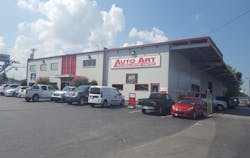According to Twila Harris, managing partner of the eight location Tennessee-based Auto Art Body Shop, finding resources for additional business is becoming more and more difficult.
“Everyone is fighting for DRPs,” Harris says. “We have a lot of those relationships, but we wanted to think outside of the box and look at different partnership opportunities.”
And Harris had the answer—dealerships.
Working in dealerships throughout college, Harris has experience working in a variety of different roles within dealerships and utilized that experience upon making the switch to independent body shops. The first MSO she worked with utilized dealer relationships and when Harris joined the Auto Art Body Shop team three years ago, she decided not to reinvent the wheel and instead use methods that had worked for her previously.
Since Harris joined the team, the MSO has doubled from four to eight locations and plans to open its ninth in July. Currently, the MSO has four dealerships that refer their customers exclusively to Auto Art Body shop locations.
“It’s a relationship based on trust,” she says. “We provide quality work for them and in return, they refer.”
Harris shares her tips for making a dealership partnership work for your shop.
Don’t Oversell and Underdeliver
Harris says that shops and dealerships are essentially looking for the same thing when it comes to partnerships—a solid reputation. Dealerships are risking a lot when they refer because if that body shop doesn’t perform, the customer will end up blaming the dealership, explains Harris.
“Many of these customers have purchased a car within the last few months and have noticed something that needs to be fixed, like a scratch,” Harris says. “When you’re the shop that the dealership is referring, you’re an extension of that new car buying experience. You may have a customer that comes in with the third Acura they’ve purchased from that dealerships, if we mess it up, that customer will be upset with the dealership.”
Harris explains that if you establish a relationship with a dealership and you’ve promised that you’ll be able to send an estimator out to the shop whenever necessary, you better be able to deliver on that.
Take Advantage of Past Relationships
Harris has a dealership background, which she says is not uncommon in this industry.
“A lot of us have crossed over from the dealership side,” Harris says.
Harris’ experience with dealerships in the area has helped her identify partnership opportunities because she has knowledge of the dealership’s reputation and the connections needed to set up the relationship.
Sell the Benefits
Once a shop has identified a desired partnership, it’s up to the shop to get the dealership to agree. Harris says that Auto Art promises to buy parts exclusively from the dealership, if they agree, which has been a major selling point.
“Think about it: If you’re talking to a Nissan dealership and there are five others in the area, this agreement eliminates us purchasing from the competition and increases that dealership’s parts revenue,” she says.
Another benefit that Harris touches on when talking to dealerships is that they’ll only have to have one point of contact. Harris says this cuts down on headaches when it comes to communication and gives peace of mind for the dealership knowing that they have a shop to recommend that they trust does quality work.
Make the Most of What You Have
Certain dealerships require certain types of equipment or certifications for repairs, Harris says. If you have a shop that already has those qualifications, it’s going to make your shop more attractive to a dealership.
Establish a Base
Though Harris says that dealerships have the option of sending work to any of Auto Art’s locations, they try and send all of their dealership work to their Nashville facility, which is larger and has the capacity to handle all of the work. Harris recommends a dedicated facility because it makes the work easier to manage. Another benefit is that the Nashville location can promise it will be able to provide staff to pick up vehicles because it is setup to allow a porter to be able to leave whenever needed. The shop uses Uber so it only requires one person leaving the shop to head to the dealership to pick up a vehicle.
Elect a Point of Contact
Along with having a dedicated base, Auto Art also has a dealer coordinator. Harris said that the MSO did not always have this position, but with the number of dealerships and amount of work that was coming in, decided it was a necessity. When it came to the coordinator, Harris chose an employee who already worked at the shop as an estimator. Harris said that they lightened his accounts and now he’s able to focus on dealership relationships. The dealerships knows to contact the dealer coordinator whenever necessary. He works at the Nashville facility and he coordinates whenever the porters need to go to the dealership. The dealer coordinator is also available to go to the dealerships and write estimates whenever needed.
Communicate
Once the relationship has been established, Harris says that constant communication is important. At least once per month, the marketing coordinator for Auto Art Body Shop visits each of the dealerships. Harris says that he’ll usually bring in donuts or something nice to show appreciation and then he’ll listen to any issues that the dealership is having.

